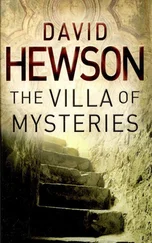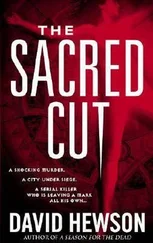Massiter leaned back on the old brown leather, let his arm wander over to the tiny fridge built into the cabinet at the end of the seats, and withdrew a small bottle of Pellegrino, misty with ice.
“Help yourself,” he beckoned.
“We’re waiting,” Falcone insisted.
The Englishman took a long gulp, then wiped his mouth with the sleeve of his silk shirt. They rounded the corner of the island, past the giant boatyards and docks, the football stadium and the odd collection of workers’ houses that no one, not even the police, paid much attention to. Murano now rose on the low, bright horizon, a spiky forest of chimneys and cranes rising up from the grey blue of the lagoon, beyond the cemetery island of San Michele, with its pale brick exterior wall, like that of a private castle, topped by a green fringe of cedar points.
“What we want,” Hugo Massiter said, “is to stop this poor old city sinking any further into its own shit. If we can.”
He leaned back, closed his eyes, then tossed the empty water bottle out of the open window, into the grey, foaming wake of the speeding vessel.
“And that, gentlemen, very much depends on you.”

ANGELO ARCANGELO HAD CREATED THE ISLAND HIMSELF, designed every last detail, intent on raising an everlasting masterpiece from the rubble he’d bought for a pittance. Everything was new, everything unique, cast in shapes that seemed impossible. The island was a testament to the power and beauty of glass, and by implication the Arcangeli themselves. On three separate plots, Angelo set out his stall for an admiring world to see. The palazzo was ninety percent leaded crystal, ten percent black iron and timber, a towering, organic beacon of light, with three curving roofs, the centre higher than the rest, rising more than twenty metres above the quayside. Behind the entrance doors the skeleton of a gigantic palm tree Angelo had imported from Sicily still lurked, its corpse now awaiting Hugo Massiter’s restorers, who had their own ideas, ones that Angelo would never have countenanced. To the right, seen from the water, stood the foundry, an elegant artisans’ workplace, fronted by four of the longest windows in Venice. They reached to the low, sloping roof, large enough to accommodate the crowds who would press their noses against the glass, wondering at the marvels being wrought by the Arcangeli’s maestri inside. And in the final third of the frontage, on the other side of the palazzo, stood Ca’ degli Arcangeli, the family home, ten apartments on three floors, with kitchens and bathrooms, offices and space to house meetings, receptions, banquets . . . . Angelo had begun his life’s project as a testament to the dynasty he was creating. By the time he died he knew the truth: that the island was an impossibility. Too expensive to maintain in the face of a public whose tastes for glass were fickle and shifting. Too complex and unwieldy to be managed by the children who followed him.
Some of the beauty remained, though. Most of all in the family temple, the shrine to the clan that was the focus of the palazzo: an airy, cavernous dining room that occupied much of the first-floor frontage, filled by the constant light of the lagoon, with uninterrupted views past the Murano lighthouse, out to San Michele and the Fondamente Nuove waterfront. He’d made the glass with his own hands, labouring for almost a year to produce an astonishing, multi-windowed eyelid over the waterfront, some panes clear, some distorting bull’s-eyes with myriad stains, all pulled together into a massive, curving viewpoint that dominated the building’s façade.
Angelo had told everyone he wanted to emulate the captain’s room of some medieval Venetian war galley, a nod back towards the Arcangeli’s boat-building past, though the squero in Chioggia had turned out nothing fancier than fishing barques that never went beyond the Adriatic. His face, stern, demanding, with some hard, unrelenting love inside it too, still stared down at them all from the large portrait that hung over the marble Doric fireplace opposite what all of them knew simply as the occhio, the eye. In the sixties, when the Isola degli Arcangeli was in its heyday, artists would gather here. Raffaella still recalled some: Igor Stravinsky patting her daughter’s head fondly, then patiently listening to her run through the scale of C on the old Steinway. Ezra Pound, a dark, morose man, sitting in the corner of the room, saying nothing, clutching a glass. Both now lay beneath the earth on San Michele across the water, among the privileged handful allowed to stay beyond the strict decade allotted to any who now wished to follow.
For all the fame of their visitors, it was her father’s presence that continued to haunt the place. This was where the clan would gather three times each day, to eat, to talk, to plot the future. Over the long years—forty-seven since Raffaella had come into the world—they’d organised liaisons and alliances, planned marriages and, on one painful occasion, a divorce. Held some kind of board meeting too, from time to time, not that the foundry ran along conventional lines, or was ever a business open to the voice of more than one man. There was always a capo . First Angelo, then Michele, the eldest, whose name meant “like God,” as he knew only too well.
She’d researched a little history in her spare time later, when she’d been recalled home from her too-brief studies in Paris to work in the family business as its finances began to falter. The supposed history was, like so much to do with the Arcangeli, a myth. The republic’s galleys never had that kind of ornate, impractical windowed platform at the house’s stern. Venice was Venice, single-minded, sensible always. Warships were made to carry cannon, not a complex panoply of handcrafted windows, tessellated like the bulging, multicoloured eye of a fly. Angelo Arcangelo had exaggerated, invented, as he always did. Beauty forgave everything, in his view, and the curious, bulbous addition to his house was extraordinarily beautiful. His daughter now sat in the embrace of the long bend of the cushioned bench built into the windows’ base, her fingers touching the familiar fading red velvet, her eyes wandering around the room.
Outside she could hear the firemen working by the quay, grumbling, shifting their machines and their heavy hoses, loading what they no longer needed back onto their boats. The bright morning air seeped in through the shuttered windows. It stank of smothered smoke. She knew that, if she looked, there would be a handful of policemen shuffling their feet by the foundry entrance, bored behind the yellow tape they’d erected.
Raffaella wondered when she would pluck up the courage to leave this room and face the world outside. Among the many myths they’d propagated within the clan these last few years was the idea that this room, with its eye over the lagoon, was a place where the power of the Arcangeli remained intact, untouched by the troubles gathering around their small island home. While the rest of the Isola crumbled and gathered dust, this place remained pristine, swept daily by her own hand now the servants were gone. Polished, cared for, it remained a symbol of what they once were, perhaps could be again. This was where she served breakfast, lunch and dinner, good plain Murano food, cornetti from the bakery round the corner, fat bigoli pasta with thick red sauce made from anchovies and Sant’ Erasmo tomatoes. Meat for supper, though not necessarily the best. And fish sometimes, if she could find it at the right price. This was where, she had come to believe, they could retreat forever.
Читать дальше













